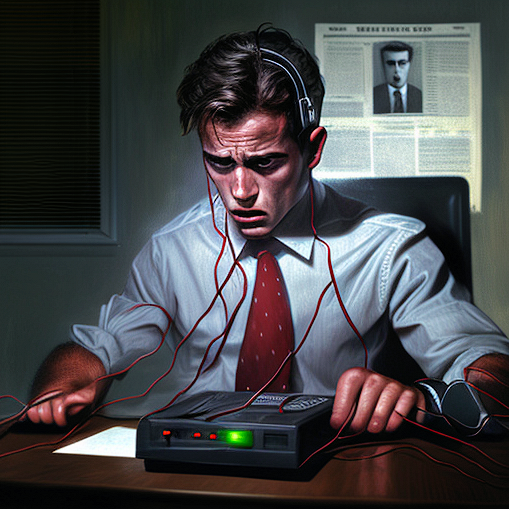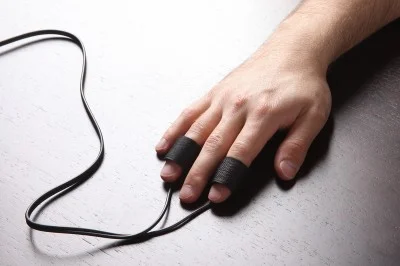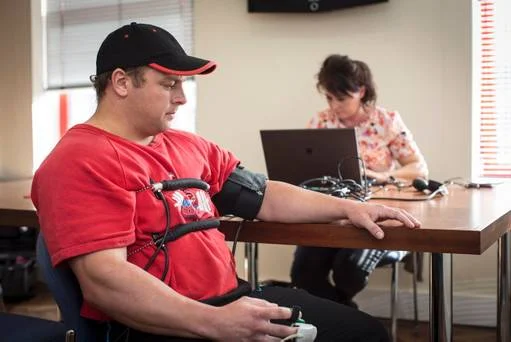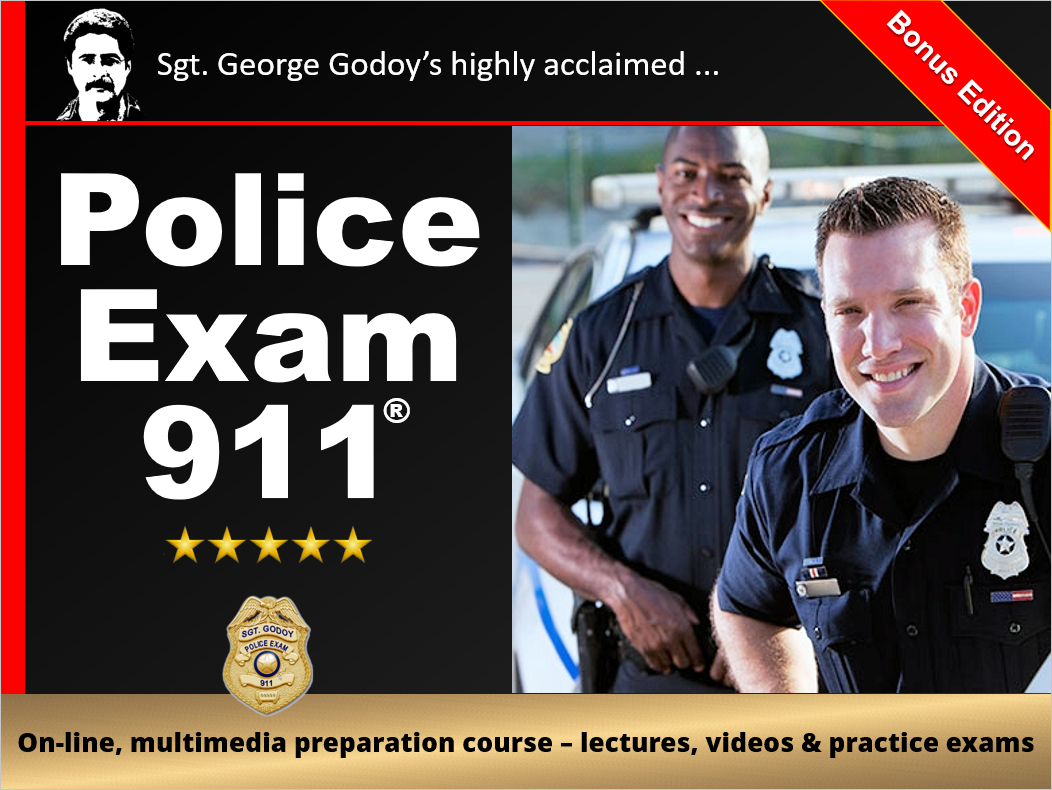Police Polygraph and CVSA Exam
Key Takeaways
- To be hired as a police officer, you must pass a Polygraph or CVSA exam, both designed to measure honesty and truthfulness.
- Learn why even honest applicants sometimes fail the Polygraph.
- Find out how to reduce your chances of failing the Polygraph Test.
- Discover an effective training plan to help you prepare and improve your confidence taking the Polygraph.
What is the Police Polygraph Exam?
Most Law Enforcement Agencies will conduct a "Truth Verification Exam." The two most common forms of this test are the Polygraph and the Computer Voice Stress Analysis (CVSA). While both methods are controversial, law enforcement needs some way to insure the honesty and integrity of its members.
A Polygraph (lie detector) is a diagnostic instrument that records physiological changes in a person caused by stress. It relies upon measuring the body's involuntary responses which occur when the subject is being deceptive or untruthful. Answering these questions can make or break your dream of becoming a police officer.
An alternative method for testing truthfulness is the Computer Voice Stress Analysis (CVSA). While it is less common than the polygraph, it can be found throughout the U.S. In California, the CVSA is used by the California Highway Patrol and other agencies.
Why do Honest People Fail the Polygraph?
Both the Polygraph and CVSA measure signs of physiological stress in the subject’s body. These machines cannot measure truthfulness.
Since the test itself is very stressful, it is not hard to understand why honest people can falsely fail it. As a job applicant, you have a lot riding on passing the exam. Even the simplest of questions can make you very nervous.
When you think about it, the most honest people may be the most sensitive and nervous about how they answer questions.
Can You Prepare for the Polygraph?
Yes - you CAN and must prepare for the polygraph! YOU want to learn how to avoid falsely failing. Knowing what to expect and having confidence in your answers will help reduce being nervous. Nervousness will lead to false positive readings and failure.
How do you prepare for the Polygraph examination? Simply put, you need to relax and place your mind and body at ease. This is easier said than done. Sgt. Godoy’s popular online course, Mastering the Polygraph and CVSA, will teach you how to achieve these results. You will learn about the whole process, the questions to expect, how best to conduct yourself and enjoy a realistic practice polygraph exam.
Questions on the Police Polygraph or CVSA
You will be asked about the following topics during a typical police polygraph or CVSA:
Shoplifting or theft of money or merchandise from employer.
Illegal drug trafficking or dealing.
Illegal drug or medication use, including steroids.
Use of alcohol.
Falsification or minimization in your requested information.
Arrests for anything other than minor traffic violations.
Commission of a crime which has not been detected.
Concealment of anything in your background that would affect your chances for this position.
Involvement in a physical fight with another person, including domestic violence.
Use of excessive physical force against another person.
Payment or receipt of any bribes.
Keep in mind, admitting to any of the above questions may disqualify you from consideration for the job. Exceptions would be minor offenses like shoplifted while a juvenile. Drug use also has certain time limits, such as, "if you haven't smoked marijuana in the last twelve months." Each police agency has their own policies, so check their minimum qualifications.
How to Prepare for the Police Polygraph or CVSA?
Preparation for the Polygraph/CVSA begins when you fill out your application. You will be asked by the examiner if the information you provide on your application is honest and complete. All the examiner cares about is, “Are you truthful or not?” Other people on the recruiting team will decide if the information is disqualifying or not. They have lots more discretion than the polygrapher has.
Even though there are flaws in the Polygraph process, giving honest answers to the questions is the best way to pass. This is not to say that in certain cases, despite giving truthful answers you are guaranteed to pass. You're not. It's not a perfect system. But if you are prepared for the exam by knowing what to expect and you are truthful, you can avoid triggering a "false failure."
Most Important During the Polygraph or CVSA
Prepare for the test and thoroughly familiarize yourself with the three types of Polygraph questions (irrelevant, relevant, control/comparison) and be able to identify them. During the "pre-test" interview all questions will be read to you. Use this time to categorize each question in your mind.
Learn about the nonverbal body language that examiners might associate with truth and deception.
Familiarize yourself with common interrogation tactics and be cautious, especially during the "post-test interview."
How to Reduce Your Risk of Failing the Polygraph or CVSA?
Make A Good First Impression
Your examiner's subjective opinion about you may influence the outcome of your Polygraph/CVSA interrogation. Look your best. Make sure you're clean shaven and have a conservative haircut. Dress professionally, polish your shoes. If you're a woman, dress conservatively.
Be friendly. Smile, but don't overdo it. Keep good eye contact with your examiner, but don't stare. Your examiner may interpret avoidance of eye contact as a sign of deception. Answer questions directly with confidence and without hesitation - but be natural.
Don't Be Late
If you're late you'll instantly make a bad impression. Your examiner may think being late is a subconscious attempt to avoid the exam - increasing his suspicion of you even before he asks his first question.
You'll Be Judged on Your Appearance and Demeanor
The moment you arrive for your Polygraph or CVSA, your examiner will be observing you. The interrogation room itself may be equipped with a two-way mirror or a concealed video camera. It may not be easy but try to avoid looking nervous. You might consider bringing something to read or otherwise keep yourself productively occupied while waiting.
The Pre-Test Interview
Be polite and cordial. Answer your examiner's questions directly, but remember to make no admissions during this time that are not already in your application.
Keep your Answers Short
Answer any yes/no question with a simple "yes" or "no." Avoid replies such as, "yes, basically" or "not really." Such evasive answers will make you appear deceptive to your examiner.
What is the Best Prep Course for the Polygraph or CVSA?
Minimize your chance of “falsely failing” your Polygraph or CVSA by studying Sgt. Godoy's 5-star, online prep course:
This course teaches honest people how to avoid “falsely failing.” It will teach you how to relax and get through this ordeal successfully.
Included in this course is an actual practice session that simulates the interrogation that you will have to endure. Not only will you be able to pass the Polygraph or CVSA, but you will be one step closer to your dream of becoming a law enforcement officer.
Note: This popular course is a bonus feature already included with Sgt. Godoy's widely acclaimed PoliceExam911 Prep Course.
Looking for the Best Police Test Prep Course?
If you are applying for a position in law enforcement, you will need to prepare to pass a wide variety of tests including the: Police Written Exam, Polygraph, Psych Exam and Oral Interview. Learn why PoliceExam911 by Sgt. George Godoy has earned the highest customer satisfaction ratings as measured by ShopperApproved™.
Sgt. Godoy also offers a wide variety of of 5-star prep courses for specific topics like Mastering the Polygraph, the Psych Exam, the Oral Interview and more. Visit his store here.











